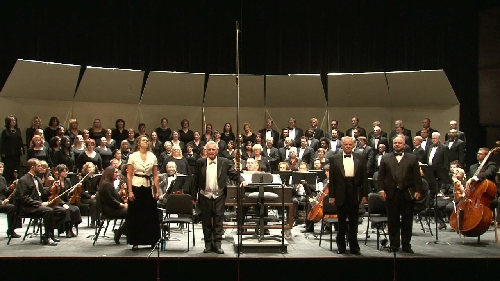Musical Arts Society embraces Bach’s ‘Passion’
Bach's back.
Don't remember the last time the classical cat played Vegas, but since Cirque du Soleil hasn't yet concocted an extravaganza based on Johnny Sebastian's greatest hits, he'll stick with the Southern Nevada Musical Arts Society, using the University of Nevada, Las Vegas as a Bach-drop.
"I'm psychologically prepared for the daunting task," says bass-baritone vocalist Neil Wilson. You can -- at least for a couple hours Sunday at Artemus W. Ham Concert Hall -- call him Jesus. "It's my messianic complex."
Kidding, folks, he's kidding -- he's really playing it with "a great sense of modesty and humility and unworthiness" when he belts out the revered role in "St. Matthew Passion," the maestro's massive choral masterwork that wasn't satisfied with standard instrumentation. "Passion" is scored for double orchestra, double choir and four solo voices in its depiction of the Passion of the Christ as presented in St. Matthew's gospel, spanning Jesus' final hours, the Last Supper, betrayal by Judas, trial with Pontius Pilate, and the Crucifixion. It concludes before the Resurrection.
"It's poignancy, contemplation, reverence all combined," says Douglas Peterson, the society's director. "The work is huge. We'll have 150 performers."
Supporting the guest soloists -- also including tenor Scott Williamson as the Evangelist, with soprano Amy Cofield Williamson and mezzo-soprano Juline Barol-Gilmore performing arias -- will be the society's 65-voice chorus and 30-piece orchestra, plus a children's choir from Greenspun Junior High School and members of the San Fernando Masterworks Chorale.
Grandeur will rule. "There's a halo of strings every time the name 'Jesus' is sung by Neil," Peterson says. "The chorus represents the crowd -- 'let him be crucified.' It has a huge emotional impact, it's truly radiant."
Composed by J.S.B. in 1727 and first performed in Leipzig, Germany, the work wound up neglected for years before composer/conductor Felix Mendelssohn -- who was Jewish -- revived interest in Bach's music and his celebration of the story of Jesus. Renewed appreciation of Bach soon blossomed in Europe in the early 19th century. "It stirs me a great deal, I'm such a softie," Wilson says. "I get emotionally involved in the music at a level that dare not overpower me because I could easily get reduced to tears."
Soloists will perform the English translation, adapted from the original German by theater/music translator Robert Shaw. Beyond the complexity of the piece, the linguistic shift presents its own challenges.
"I've done it twice, only in German," says Williamson. "I feel like I'm learning the piece again, in English. There are places where only someone who knows it in the original German might notice that the adaptation is a little forced. But because it's in the language we speak, it will be powerful and effective."
Likewise, Wilson had previously performed "Passion" in German. "Some of the most powerful passages using the original German text take the voice in directions in terms of vowel sounds and consonants that English just cannot do," Wilson says. "When you translate the meaning, some of the powerful words are not on the most powerful parts of the phrases. There are some places where I would just as soon say, 'Let me sing the next phrase in German because it lies so much more comfortably in the voice.' "
Deeply devout as it's rooted in the New Testament, "St. Matthew Passion" has the potential to feel exclusionary to nonreligious listeners or those of other faiths and even engender controversy, as did Bach's companion oratorio, "St. John Passion." That piece has been attacked as anti-Semitic, stemming from the larger debate over the tone of the Gospel of John and its references to Judaism.
"That is always a fear," Williamson says about possibly limiting the audience because of the sacred subject matter. "Bach is at once the most Christian of composers and is also the most universal. The setting, the last words of Christ, the Crucifixion, are the most risky to program for the public for a secular concert. But one of the great things about Bach is that he transcends that."
Musicality, Wilson adds, trumps religiosity. "I see people like (the late, Jewish composer) Leonard Bernstein talking about the music and he's moved by it because he realizes what it is intellectually, and the craftsmanship at work," Wilson says, adding that cherishing the artistry runs both ways.
"I've had people say to me, 'I don't understand how you can sing Jewish music.' Well, I do and it's wonderful, great music, as a lot of Catholic, Lutheran and Anglican music is great stuff."
Sounds like it could be a hot Bach-stage discussion.
Contact reporter Steve Bornfeld at sbornfeld@ reviewjournal.com or 702-383-0256.
Preview
Johann Sebastian Bach's "St. Matthew Passion" by Southern Nevada Musical Arts Society
3 p.m. Sunday
Artemus Ham Hall, University of Nevada, Las Vegas,
4505 S. Maryland Parkway
$5-$15 (895-2787; pac.unlv.edu; www.snmas.com)






















